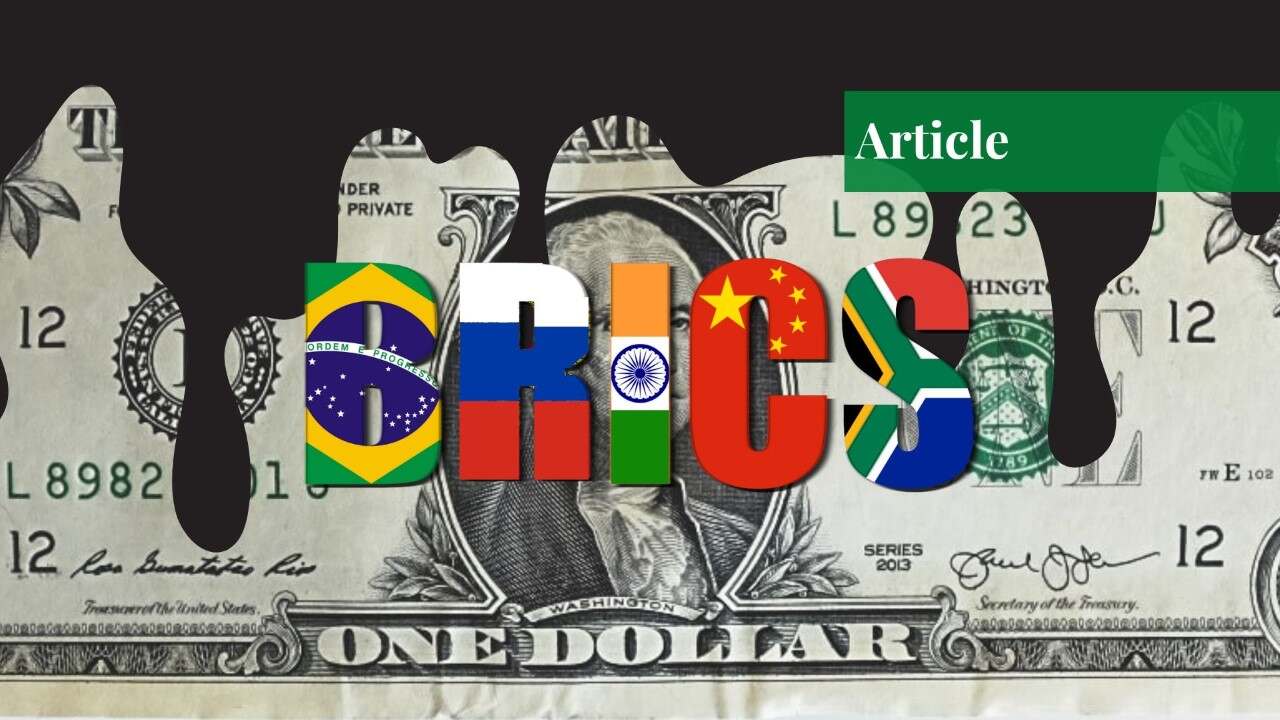Introduction
As the international system is transitioning from a unipolar world to a multipolar world, the significance of the countries in the East is increasing. It is visible that new power centers are emerging on the world stage in the form of China, India, South Africa, and Saudi Arabia, among others. In wake of the changing paradigm of the world, the US is facing a significant decline in its power and stronghold, particularly the petrodollar, that it once maintained in the post-cold war era.
Dollar’s Dominance
To understand how dollar dominance is being impacted by the current global situation, it is important to understand the significance of the dollar on the global stage. The US helped Israel militarily in the 1973 Yom Kippur War. This made the Arab countries impose embargos on the oil which skyrocketed the cost of petroleum products; oil prices increased from 3 dollars per barrel to 17 dollars per barrel. This led to one of the biggest economic recessions faced by the world.
As a result, the USA decoupled its currency from gold, and it led to a drastic decline in the value of the dollar. However, in 1974, when the embargo was lifted, the US saw the real value of petroleum products and so it made a secret agreement with Saudi Arabia related to oil exports. According to the petrodollar agreement, Saudi Arabia was supposed to sell oil in dollars, and in return for this, the US would provide military assistance in the form of selling weapons to Saudi Arabia Thus, the petrodollar agreement came into being.
BRICS Threatens the Dollar
This petrodollar agreement was the main reason why even after the end of the Bretton Woods system, the US dollar was able to dominate the world. However, this agreement which is considered the backbone of the US economy is being threatened by Saudi Arabia’s interest in joining BRICS. BRICS is a political and economic international organization that contributes to 40% of the world’s population, 20% to the world’s GDP, and 16% to international trade.
BRICS aims to come up with an alternative international system to IMF and World Bank. In addition to this, it also aims to develop its own reserve currency. At the 14th summit of BRICS, President Putin came up with the idea of a reserve currency which will be a basket currency system that should constitute the ruble, yuan, Indian rupee, South African rand, and Brazilian real. This would in turn be pegged with gold.
The idea behind this is to develop a more decentralized currency, and pegging it with gold will enhance the investor’s confidence in it. But the question remains: how will the inclusion of Saudi Arabia into the organization damage the petrodollar agreement? As the world’s emerging economies like Russia, China, India, Brazil, and South Africa constitute major oil trade in the world. Thus, if Saudi Arabia becomes a member of the BRICS, it will sell oil to these countries in the BRICS reserve currency which will shift the trade away from the dollar.
In addition to this, the countries to buy oil in BRICS currency would need other currencies for which they would have to withdraw their US treasury bonds. This would mean that the loans the US provides to businesses at a very low-interest rate will no longer be possible, which will bring a severe impact on the country’s development. These bonds which are around 7.5 trillion dollars in worth will be withdrawn, reducing not only the dollar demand but also impacting the developmental progress of the US.
Although there hasn’t been any formal agreement on the given issue, and Saudi Arabia is also reluctant, the possibility cannot be completely discarded. It is believed that if this becomes a reality, it might even alter the world order, as the current world order primarily stands on dollar dominance. The BRICS reserve currency which aims to be backed by gold will also have the backing of oil, making this currency far more valuable and stronger than the dollar.
Besides, the market will have more confidence in the BRICS currency because it will be more stable. Thus, it can shift international trade away from the dollar in the long run. Moreover, if the BRICS currency is not functionalized, countries can still go ahead with currency swap agreements like the ones already happening between Russia and India.
China & Saudi Arabia
The recent visit of the Chinese president to Saudi Arabia primarily centered around the oil trade with China in yuan. Although these talks have been going on for more than six years, they have accelerated recently. Therefore, if the two countries agree to trade oil in yuan it will be a major setback to the demand for the dollar. China buys more than 25% of its oil from Saudi Arabia which will shift a major portion of oil sales away from dollar to yuan.
If China were to buy oil in yuan, it will have to take out its currency from the US treasury bank which alone is 1 trillion dollars, big enough to give the US economy a shock. China is also working on a prototype model of an international payment system called the mBridge. This system is to make international transactions with central banks in digital currencies. It is simply an alternative to SWIFT. This system would include the banks of UAE, China, Thailand, and Hong Kong to conduct payments worth 22 million dollars. Therefore, if this becomes functional, it too will be a challenge to the dollar.
Although there is still no certainty that these systems will materialize or Saudi Arabia will join BRICS, it is sure that the balance of power is shifting away from the US. The recent threat to the petrodollar has also emerged because of the realignment between Saudi Arabia and US relations. Ever since President Joe Biden came into power, the US has been more focused on the Indo-Pacific region.
When OPEC countries decided to cut 2 million barrels per day, it compelled the US to pass the NOPEC bill which increased the tensions between the two old allies. With the Russia-Ukraine war, oil has become the most crucial element to define international relations. Therefore, the future of the petrodollar seems dark in the near future. However, in international relations, one can never be very sure about the future as there are no permanent friends or enemies in international relations, only permanent interests.
If you want to submit your articles and/or research papers, please check the Submissions page.
The views and opinions expressed in this article/paper are the author’s own and do not necessarily reflect the editorial position of Paradigm Shift.



















